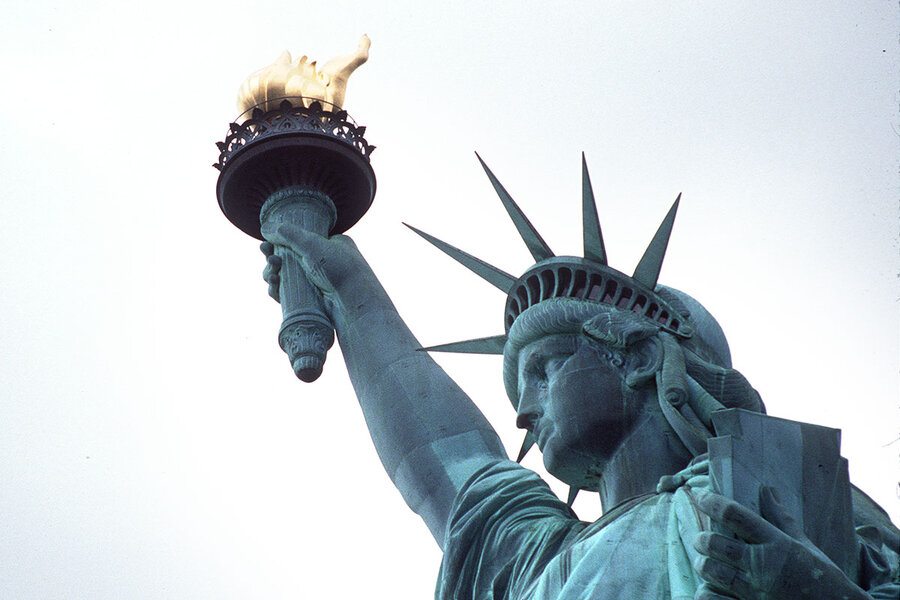The world and the 'idea of America'
Loading...
| London
Critics of the United States note that the “idea of America” has not always been perfectly honored – whether at home, for African Americans and other minorities; or abroad, where realpolitik has often meant cozying up to autocrats. But even adversaries have seen America as special. Two issues in particular – freedom of expression, and the world’s response to refugees and asylum-seekers – may bear watching. On both, the US has long played a crucial role, not just through policies or actions, but the “soft power” example of the American idea. In repressed societies, dissidents or democracy activists have often viewed America’s First Amendment freedoms not merely with admiration or envy, but as a kind of gold standard to which they believed their own governments should ultimately be held to account. America has also played the leading role in helping refugees worldwide. While President Trump’s speech last week at the United Nations was consistent with his “America First” credo, a shift of which it’s a part – an aggressive stance toward news organizations, a tighter cap on refugee admissions – could have real-world consequences as its example ripples out.
Why We Wrote This
America isn't universally loved. But its standards on issues like freedom of expression and rule of law carry substantial influence throughout the world. How might an "America First" credo affect that?
It’s a statement that sounds compelling but which, like much else in recent US politics, has invited dueling critiques from left and right: that America is more than just a country, or a culture. “America is an idea.”
If so, we’ve just seen a dramatic retreat from so-called American exceptionalism: the belief that the idea is special, and that America’s democratic experiment has given it a role to inspire others around the world. The forum was last week’s annual gathering of world leaders for the UN General Assembly. President Trump delivered an address defining the US as a superpower, but a country like any other – each with a “distinct culture, a rich history … and the values that make our homelands like nowhere else on earth.”
While the speech was entirely consistent with his “America First” credo, the wider shift of which it’s a part could have real-world consequences.
Why We Wrote This
America isn't universally loved. But its standards on issues like freedom of expression and rule of law carry substantial influence throughout the world. How might an "America First" credo affect that?
In my own 45-year experience as a foreign correspondent, the outside world does see the “idea of America” as exceptional: an amalgam that includes democracy and the rule of law; freedom of worship, expression, and protest; and the promise of opportunity at the core of the old American Dream.
America isn’t universally loved. Its critics point out that the “idea of America” has not always been perfectly honored – whether at home, for African-Americans and other minorities; or abroad, where realpolitik has often meant cozying up to autocrats. But even adversaries have seen America as somehow special. When I first met PLO leader Yasser Arafat, an aide welcomed me with a lecture about “American-Zionist imperialism.” Later, he drew me aside and asked how to get a green card.
Two issues in particular – freedom of expression, and the world’s response to refugees and asylum-seekers – may bear watching. On both, the US has long played a crucial role, not just through policies or actions, but the “soft power” example of the American idea.
Especially in countries like Syria or the former USSR, or the black townships of state-of-emergency South Africa, I’ve been struck by how dissidents or democracy activists viewed America’s First Amendment freedoms: not merely with admiration or envy, but as a kind of gold standard to which they believed their own governments should ultimately be held to account.
The First Amendment is alive and well in the US. The question for press-freedom advocates overseas is whether Mr. Trump’s refrain of “fake news” and his characterization of critical voices as “enemies of the people” could further embolden regimes like Vladimir Putin’s in Russia or Recep Tayyip Erdogan’s in Turkey, where independent journalists have been silenced, even killed.
America has also played the leading role in helping refugees worldwide: now numbering nearly 70 million, according to the UN, including some 25 million fleeing war or fear of persecution. That, too, has been seen as part of the American idea, embodied in the words of welcome on the Statue of Liberty.
The US remains the largest donor to the UN’s refugee program. Since the 1980 US Refugee Act helped kickstart an international effort to address the problem, around three-quarters of the 4 million people resettled have come to America.
The number admitted fell steeply, however, in the first year of the Trump administration: from nearly 100,000 to 33,000. Next year’s cap has been set at 30,000. The question that has prompted abroad is whether at a time when other countries, especially in Europe, are facing pressure from anti-immigration nationalists, Washington’s example will make the argument for offering refuge doubly difficult.
A wider potential impact was highlighted by Israeli politician Natan Sharansky after the US-North Korea summit. He was imprisoned in the USSR as a human rights activist. When Trump omitted any reference to North Korea’s human rights record, suggesting North Koreans supported Kim Jung-Un’s dictatorship with “great fervor,” Mr. Sharansky wrote about how important US-led criticism of Soviet human rights violations was in keeping his and other dissidents’ hopes alive.
Trump should “understand how demoralizing it is for dissidents … to commend the supposed love affair between Kim and his people,” he said. “Such statements undermine America’s moral standing and dampen North Korean dissent, the most powerful unconventional weapon in the fight against dictatorship.”








